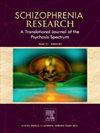Psychosis in Huntington's disease: a review and comparison with schizophrenia
IF 3.5
2区 医学
Q1 PSYCHIATRY
引用次数: 0
Abstract
Psychosis is a relatively rare phenomenon in Huntington's disease (HD) yet it occurs more commonly amongst individuals with HD than in the general population. Its presence is associated with significant distress and caregiver burden. This review evaluates the epidemiology, aetiology, phenomenology, neurobiology and treatment of psychosis in HD, drawing comparisons with schizophrenia as an archetypal psychotic disorder. We conducted a detailed literature search and narrative synthesis and found that prevalence estimates of psychosis in HD varied widely (4.1–17.6 %). While generally more common in those with established motor symptoms, psychosis occurred throughout the HD course. Its presence conferred a poorer prognosis, including greater functional and cognitive decline. No distinct phenomenology of psychosis in HD emerged; paranoid ideation was common whereas formal thought disorder was rarely reported. Like schizophrenia, psychosis in HD is associated with depression, suicidality, apathy, executive and social cognitive dysfunction. The neurobiology of psychosis in HD is not well understood however HD neurobiology shares some overlap with schizophrenia. Despite the absence of mesostriatal hyperdopaminergic transmission, frontostriatal network dysfunction, glutamatergic dysregulation and medium spiny neuron pathology could contribute to psychosis manifestation. The development of psychosis in HD is conceptualised within a stress-diathesis framework, involving an interaction between genetic risk (with some shared vulnerability to schizophrenia), neuronal changes and psychosocial stressors. Clinically, this implies a rationale for utilising therapeutic approaches trialled in schizophrenia, as there is no evidence that psychosis in HD requires fundamentally different treatment, except for an awareness of the antipsychotic effects on HD motor symptoms.
亨廷顿舞蹈病的精神病:与精神分裂症的回顾和比较
在亨廷顿舞蹈病(HD)中,精神病是一种相对罕见的现象,但它在亨廷顿舞蹈病患者中比在一般人群中更常见。它的存在与严重的痛苦和照顾者负担有关。本文综述了HD的流行病学、病因学、现象学、神经生物学和治疗,并将其与精神分裂症作为一种典型精神障碍进行了比较。我们进行了详细的文献检索和叙事综合,发现HD患者精神病患病率估计差异很大(4.1 - 17.6%)。虽然通常在有运动症状的患者中更常见,但精神病在HD病程中始终存在。它的存在导致预后较差,包括更大的功能和认知能力下降。HD患者没有明显的精神现象学特征;偏执观念是常见的,而正式的思维障碍很少被报道。像精神分裂症一样,HD患者的精神病与抑郁、自杀、冷漠、执行和社会认知功能障碍有关。HD精神病的神经生物学尚不清楚,但HD神经生物学与精神分裂症有一些重叠。尽管中纹状体高多巴胺能传递缺失,但额纹状体网络功能障碍、谷氨酸能失调和中棘神经元病理可能导致精神病的表现。HD患者精神病的发展是在应激素质框架内概念化的,涉及遗传风险(有一些共同的精神分裂症易感性)、神经元变化和社会心理压力因素之间的相互作用。在临床上,这意味着利用精神分裂症试验的治疗方法的基本原理,因为没有证据表明HD精神病需要根本不同的治疗,除了意识到对HD运动症状的抗精神病作用。
本文章由计算机程序翻译,如有差异,请以英文原文为准。
求助全文
约1分钟内获得全文
求助全文
来源期刊

Schizophrenia Research
医学-精神病学
CiteScore
7.50
自引率
8.90%
发文量
429
审稿时长
10.2 weeks
期刊介绍:
As official journal of the Schizophrenia International Research Society (SIRS) Schizophrenia Research is THE journal of choice for international researchers and clinicians to share their work with the global schizophrenia research community. More than 6000 institutes have online or print (or both) access to this journal - the largest specialist journal in the field, with the largest readership!
Schizophrenia Research''s time to first decision is as fast as 6 weeks and its publishing speed is as fast as 4 weeks until online publication (corrected proof/Article in Press) after acceptance and 14 weeks from acceptance until publication in a printed issue.
The journal publishes novel papers that really contribute to understanding the biology and treatment of schizophrenic disorders; Schizophrenia Research brings together biological, clinical and psychological research in order to stimulate the synthesis of findings from all disciplines involved in improving patient outcomes in schizophrenia.
 求助内容:
求助内容: 应助结果提醒方式:
应助结果提醒方式:


